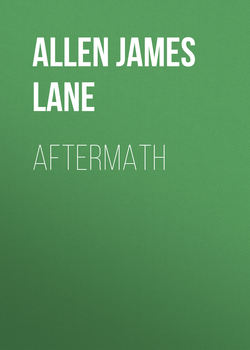Читать книгу Aftermath - Allen James Lane - Страница 3
II
ОглавлениеI have forgotten nature. I barely know that July, now nearly gone, has passed, sifted with sweetness and ablaze with light. Time has swept on, the world run round; but I have stood motionless, abiding the hour of my marriage as a tree the season of its leaves. For all that it looks so calm, within goes on a tremendous surging of sap against its moments of efflorescence.
After which I pray that, not as a tree, but as a man, I may have a little peace. When Georgiana confessed her love, I had supposed this confession to mark the end of her elusiveness. When later on she presented to me the symbol of a heart pierced with needles, I had taken it for granted that thenceforth she would settle down into something like a state of prenuptial domestication, growing less like a swift and more like a hen. But there is nothing gallinaceous about my Georgiana. I took possession of her vow and the emery-ball, not of her; the privilege was merely given to plant my flag-staff on the uncertain edge of an unknown land. In war it sometimes becomes necessary to devastate a whole country in order to control a single point: I should be pleased to learn what portion of the earth's surface I am required to subdue ere I shall hold one little citadel.
As for me, Georgiana requires that I shall be a good deal like an old rock jutting out of the quiet earth: never ruffled, never changing either on the surface or at heart, bearing whatever falls upon me, be it frost or sun, and warranted to waste away only by a sort of impersonal disintegration at the rate of half an inch to the thousand years. Meantime she exacts for herself the privilege of dwelling near as the delighted cave of the winds. The part of wisdom in me then is not to heed each sallying gust, but to capture the cave and drive the winds away.
For I know in whom I have believed; I know that this myriad caprice is but the deepening of excitement on the verge of captivity; I know that on ahead lie the regions of perpetual calm—my Islands of the Blest.
Georgiana does not play upon the pianoforte; or, as Mrs. Walters would declare, she does not perform upon the instrument. Sylvia does; she performs, she executes. There are times when she will execute a piece called "The Last Hope" until the neighbors are filled with despair and ready to stretch their heads on the block to any more merciful executioner. Nor does Georgiana sing to company in the parlor. That is Sylvia's gift; and upon the whole it was this unmitigated practice in the bosom—and in the ears—of her family that enabled Sylvia to shine with such vocal effulgence in the procession on the last Fourth of July and devote a pair of unflagging lungs to the service of her country.
But Georgiana I have never known to sing except at her sewing and alone, as the way of women often is. During a walk across the summer fields my foot has sometimes paused at the brink of a silvery runlet, and I have followed it backward in search of the spring. It may lead to the edge of a dark wood; thence inward deeper and deeper; disappearing at last in a nook of coolness and shadow, green leaves and mystery. The overheard rill of Georgiana's voice issues from inner depths of being that no human soul has ever visited, or perhaps will ever visit. What would I not give to thread my way, bidden and alone, to that far region of uncaptured loveliness?
Of late some of the overhead lullabies have touched me inexpressibly. They beat upon my ear like the musical reveries of future mother hood—they betoken in Georgiana's maidenhood the dreaming unrest of the maternal.
One morning not long ago, with a sort of pitiful gayety, her song ran in the wise of saying how we should gather our rose-buds while we may. The warning could not have been addressed to me; I shall gather mine while I may—the unrifled rose of Georgiana's life, body and spirit.
Naturally she and I have avoided the subject of the Cardinal. But to the tragedy of his death was joined one circumstance of such coarse and brutal unconcern that it had left me not only remorseful but resentful. As we sat together the other evening, after one of those silences that fall unregarded between us, I could no longer forbear to face an understanding.
"Georgiana," I said, "do you know what became of the redbird?"
Unwittingly the color of reproach must have lain upon my words, for she answered quickly with yet more in hers,
"I had it buried!"
It was my turn to be surprised.
"Are you sure?"
"I am sure. I told them where to bury it; I showed them the very spot—under the cedar. They told me they had. Why?"
I thought it better that she should learn the truth.
"You know we can't trust our negroes. They disobeyed you. They lied to you; they never buried it. They threw it on the ash-pile. The pigs tore it to pieces; I saw them; they were rooting at it and tearing it to pieces."
She had clasped her hands, and turned towards me in acute distress. After a while, with her face aside, she said, slowly,
"And you have believed that I knew of this—that I permitted it?"
"I have believed nothing. I have waited to understand."
A few minutes later she said, as if to herself,
"Many a person would have been only too glad to believe it, and to blame me." Then folding her hands over one of mine, she said, with tears in her eyes:
